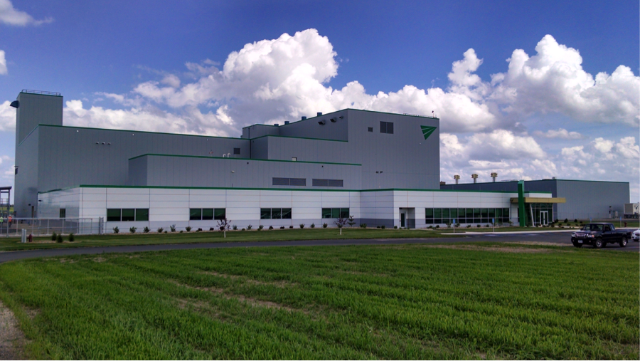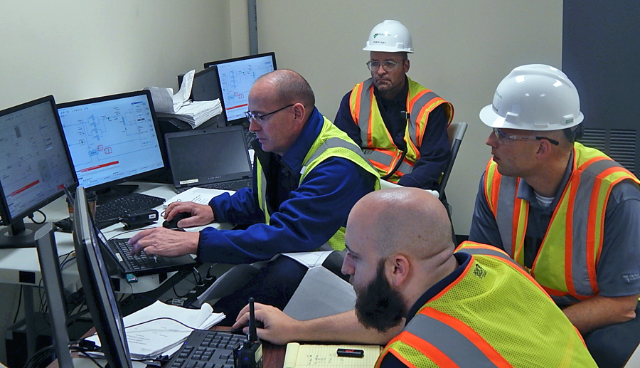Planting seeds of success at an agricultural biotech company
When Luke Porisch began working for Valent BioSciences in 2012, he was the lone employee in the office, a white farmhouse in a sleepy Iowa town of 3,500 people.
Porisch, S.M. ’05, who studied engineering sciences at the Harvard John A. Paulson School of Engineering and Applied Sciences (SEAS), oversaw nearly every detail during the two-year construction process as a $150 million biotech fermentation facility rose above the surrounding cornfields.
“It was kind of like working for a startup,” Porisch recalled. “This wasn’t mechanical engineering; I was faced with a whole new set of problems.”
Today, he serves as engineering manager at the 100-employee plant, which researches and produces biorational materials, such as biopesticides and crop stress management products, all made from natural components.

Porisch oversaw nearly every detail during the construction of this Valent BioSciences biotech fermentation facility in St. Ansgar, Iowa. (Photo provided by Luke Porisch.)
While the position in St. Ansgar, Iowa was a homecoming for this Midwesterner, Porisch’s role is a significant departure from the educational path he followed.
Following in the footsteps of his grandfather, who had worked for NASA during the height of the space race, he pursued mechanical engineering as an undergraduate. He attended the Air Force Academy, where the six-foot-five Porisch stood out academically and on the gridiron as starting right tackle for the Falcons.
After graduation, he was assigned to a research laboratory at an Air Force base in Bedford, Mass. He worked on microelectromechanical systems (MEMs), developing tiny 3D-printed structures that would be used as components for military radio frequency communication devices.
“One thing that research experience taught me was the value of repetition,” he said. “Test preparation and data analysis are critical steps for research, but you can’t overlook the value of just sitting and thinking about things, of taking information and trying to make sense of it.”
Looking to broaden his horizons, Porisch enrolled in the S.M. program at SEAS as a part-time student. He enjoyed the theoretical nature of his coursework, which gave him practical skills he could quickly apply in his Air Force research.
After earning his graduate degree, Porisch was assigned to an Air Force base in Colorado, and later switched gears to take on a business strategy role for an avionics company in Cedar Rapids, Iowa.
Working on mergers and acquisitions and portfolio analysis may not have been the kind of technical engineering work he had gotten used to, but Porisch quickly found that his analytical skills served him well.
“The engineering approach to problem solving fits well into so many other disciplines,” he said. “I found that structure of thinking to be very useful in business.”
He first heard of Valent BioSciences at a DARPA technology demonstration and, when he learned the firm was seeking an engineering manager for a new plant near his hometown, he jumped at the opportunity.
“It was a very easy company to get behind. We primarily grow bacteria that produces protein toxins that are highly specific to insects,” he said. “There is a lot of interest now in more sustainable ways of handling pest pressures and increasing food production for a growing world. It is exciting to be at the forefront of those efforts.”
Now that the facility is up and running, Porisch works to enhance and streamline operations. For instance, his team recently implemented new machinery and processes that combines two steps in a 10-step manufacturing process.
It may seem like a simple efficiency, but with so many different balls in the air, one change could cause serious problems elsewhere in the plant.
“Nothing happens in a vacuum. If we make a change to the equipment, it might not be better from someone else’s perspective,” he said.

Porisch and his team work to enhance and streamline operations at the Valent BioSciences facility. (Photo provided by Luke Porisch.)
But the problem solving aspect of his job, and the collaboration with skilled coworkers, make the work engaging. He is looking forward to continued growth at Valent BioSciences. The firm is developing new biorational products, including those that enhance crop development, deliver beneficial fungi to the plant root zone, and important mosquito control products that fight vector-borne diseases here and abroad.
While he never expected to work in the realm of biorational crop protection and enhancement, the skills he developed at SEAS have helped him succeed.
“At Harvard, I learned to respect the knowledge and understanding of the people I was working with, and to approach problems with rigor,” he said. “But perhaps the best lesson I learned was humility. The more you delve into one area, the more you understand how little you know. Once you grasp that, it becomes much easier to ask people for advice and learn and grow.”